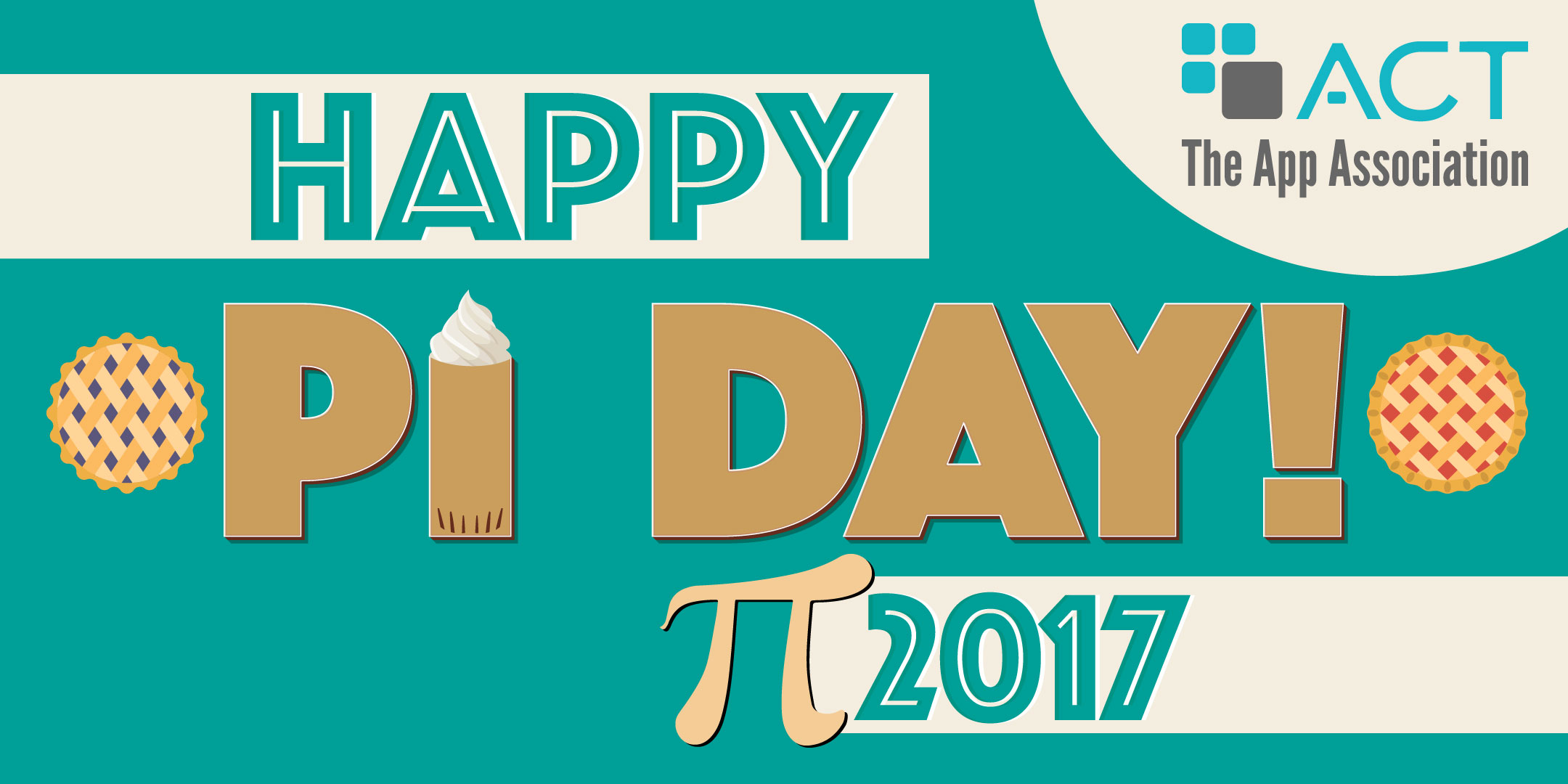There’s an infinite number of reasons to support computer science education.
These reasons from our members take the cake.
Pi, or the number irrationally known as 3.141592653… is a mathematical representation used throughout the science, technology, engineering, and math (STEM) fields, and it is critical to the science and technologies that support the mobile apps we use and love.
Back in 2009, the U.S. House of Representatives supported the designation of March 14 as Pi Day, and every year since, ACT | The App Association has used the day to highlight the important need for computer science education throughout our country.
Unlike pi, an irrational number that when written as a decimal continues infinitely without repeating, America has a small and finite number of graduates with computer science backgrounds to fill the hundreds of thousands of available computing jobs across the nation. That’s why last year, the App Association joined a diverse group of businesses and NGOs to establish the Computer Science Education Coalition (CSEC) to promote the expansion of K-12 computer science education in America. The coalition is urging Congress to help fill critical tech sector jobs by providing the educational foundation necessary to support them.
At the App Association, we represent over 5,000 small and medium-sized app companies that create mobile solutions for education, healthcare, finance, and industries in between, and no one knows the need for computer science education more intimately than we do. Our members’ products and programs are developed by some of the world’s smartest programmers and computer engineers, but in order to continue to support their innovative ideas, we must work together to address the talent shortage impacting our tech community.
“Of the 51 high schools in my congressional district, only eight of them offer computer science. Eight”
– Julie Yack, owner of Colorado Technology Consultants Inc.
Today, only one in four schools teach any computer science courses, depriving our students of skills that may help them succeed in various fields in the future. Julie Yack, App Association member and owner of Colorado Technology Consultants, Inc., aptly notes, “of the 51 high schools in my Congressional district, only eight of them offer computer science. Eight. This problem is not unique to Colorado Springs. This problem is not unique to Colorado. It is a national issue. Nationwide nearly 250,000 jobs sit empty. A quarter of a million high paying jobs just waiting for a qualified employee.”
“Computing is used in virtually every field. To withhold that basic knowledge puts our workforce at a distinct disadvantage, which, in turn, puts our nation behind.”
– Ann Adair, co-founder of Thinkamingo
Of the American students engaged in STEM education, only 8 percent of graduates are in computer science fields. However, studies show that 71 percent of all new jobs in STEM fields are in computing. Co-founder of Tampa-based mobile app development firm Thinkamingo, Ann Adair, understands the broader applications, and implications, for computer science education. “Computing is used in virtually every field. To withhold that basic knowledge puts our workforce at a distinct disadvantage, which, in turn, puts our nation behind. Consider the ramifications of this on a much larger scale like national security. What happens when we can’t provide our own citizens to fill those positions in the military and financial systems?”
“Every American is a stakeholder in tech. We have to take action now to make sure that we’re ready as a nation to stand together and compete on the international scale.”
– Marc Fischer, president and co-founder of Dogtown Media
The United States has long been a leader in technology innovations, but without strong computer science education, we risk falling behind. Our colleges and universities graduate roughly 43,000 computer science students each year, a trend that Marc Fischer, president of leading mobile app developer Dogtown Media, suggests may have an impact on our local communities. He shared, “over a million tech positions went unfilled in 2015, forcing many companies to outsource or bring in outside help rather than hire locally and participate in their local economy. Every American is a stakeholder in tech. We have to take action now to make sure that we’re ready as a nation to stand together and compete on the international scale.”
Access to comprehensive computer science courses, at all stages of education, will help prepare Americans for a competitive and evolving workforce, and equip them with the necessary tools to succeed in an array of well-paying computer science jobs. The U.S. Department of Labor projects that by 2020, there will be 1.4 million computer specialist job openings, but American universities will only be able to produce enough graduates to fill 29 percent of those jobs. The need for wide-spread computer science education is a national imperative, now more than ever.
On Pi Day, and every day, we will continue to push for widespread computer science education that will support our students, our innovative companies, and the American economy as a whole.
